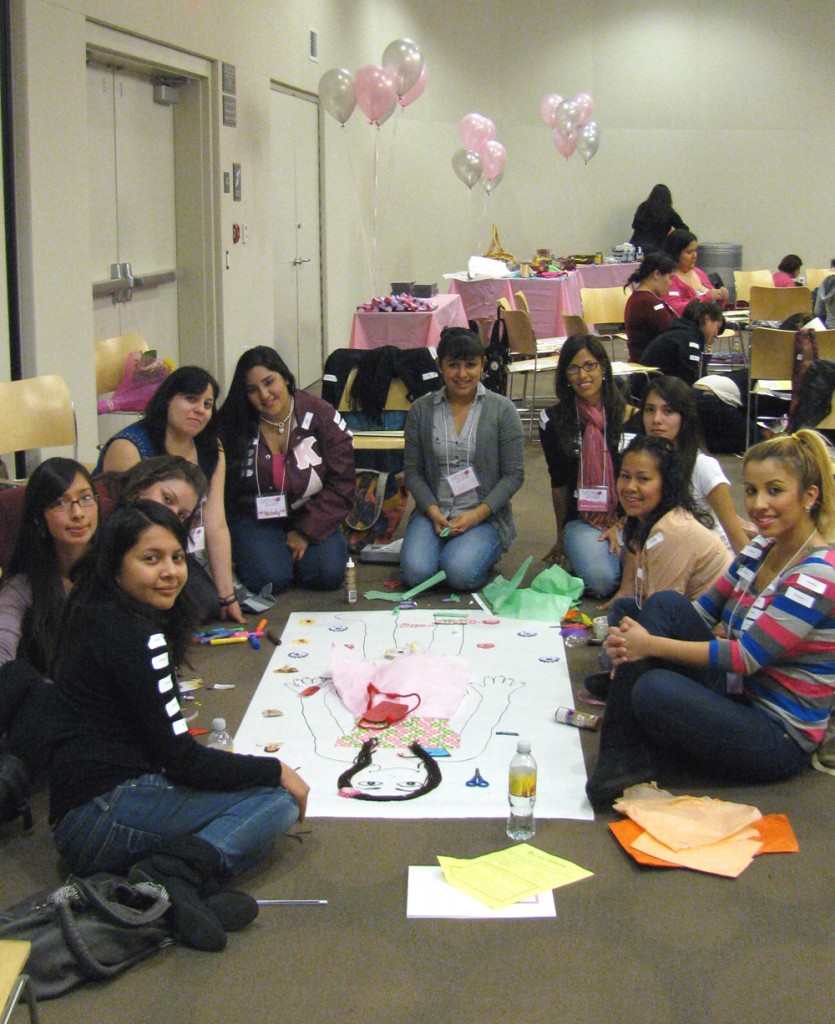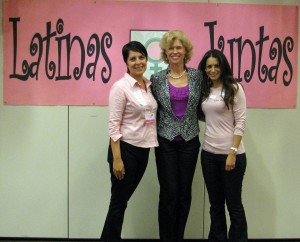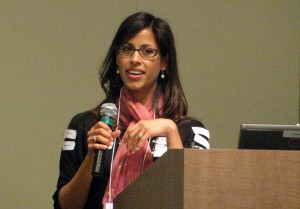Whether they were first-time participants at Latinas Juntas or returning for another year, Latinas of the CSU Dominguez Hills campus community found strength in their experiences with one another at the annual event, which took place in the Loker Student Union on Dec. 2. Through conversations and group exercises, the day-long conference provides support, mentorship, and a social setting for Latina students to realize that they are not alone in their struggles – cultural and otherwise – toward achieving a higher education.

Monica Rosas-Baines and Denna Sanchez, psychologists in Student Health & Psychological Services, created Latinas Juntas eight years ago in order to directly address the cultural pressures of family responsibilities, gender role conflicts, negative stereotypes, lack of role models, isolation on campus, and personal insecurity that many of their Latina clients were facing as first-generation college students.
“Often our students believe they are the only ones struggling with particular problems,” said Rosas-Baines. “They are relieved to know that others have gone through the same thing, and that there are resources available to help them.”
Sanchez said that Latinas Juntas evolved from a smaller program where she and Rosas-Baines focused on issues of education, culture, and the Latina experience, to an opportunity to interact with students, faculty, staff, and alumni in successful careers who wish to give back to their alma mater by mentoring current students.
“As therapists here on campus we work with students one on one,” said Sanchez. “It is a gift to be able to meet so many of our students at Latinas Juntas and learn about their experiences. The event allows us to stay in touch with the students that we serve. It also gives us the opportunity to develop relationships with Latina professionals from CSU Dominguez Hills.
“We have met so many students with such inspiring stories of beating odds and perseverance. The day inspires students and it inspires us to continue to work to improve the lives of our students.”
Using silent exercises, small group discussions and art activities, Rosas-Baines and Sanchez have fostered a safe environment for Latina students to share their issues and for alumni and faculty to offer support and counsel.
Sophomore Melissa Cervantes said that she attended Latinas Juntas this year to learn what it was about.

“It was empowering… and at the same time educational,” she said. “I believe every female even if [she’s] not Latina, should participate. I hoped to learn about what makes us all unified as females. Throughout daily life…we never truly ask [each other] ‘How are you doing today?’ on an interior level, not just externally. What I did learn was that we all experience the same things: dreams, goals, struggles, and little victories. I was surprised to find out that many of my fellow students had been through abusive relationships, family struggles, and most of all, insecurities that sometimes inhibit us as females from going to that step beyond.”
Diana Lopez, a junior majoring in psychology, is the first in her family to attend a university. She said that through Latinas Juntas “we are able to learn and inspire one another.” While participating in Latinas Juntas for a second year, she said that the event has helped her to learn that she is not alone in her struggles for an education.
“I had many questions in the beginning and it would have been helpful if someone in my family would have guided me through this,” she said. “Instead I had to figure it out on my own.”
Anahi Garcia, a junior majoring in accounting, was encouraged to attend by her sister, Maria Garcia, who attended the event last year. She said that her favorite activity was the small group conversation because the participants were comfortable enough to candidly share their experiences with one another and find that they had much in common, especially cultural challenges on the path to a college degree.
“One of the main challenges that are related to my Latina background is working very hard to get good grades in order to prove that as a Latina I could be successful and not a mere housewife or a maid,” said Garcia.
Jennifer Lopez, a freshman majoring in criminal justice, said that she hoped to find peer support and mentorship by attending Latinas Juntas. She enjoyed the “comadre” exercise, where small groups of students were given the chance to create a collage that depicted the ideal qualities of a comadre, or close friend and confidante.
“This was an amazing day because I got to see many Latinas united and see the strong community we are,” said Lopez. “I admire all the people who attended this event, in which we boosted our self-esteem because we are smart young women that have the capacity to accomplish our goals. It helped us all see for ourselves that we are not alone and that together we can confront our challenges.”
Cervantes said that the concept of a comadre provides a refuge from the challenges of being a first-generation college student.
“Latinas Juntas helped me find ways to handle this challenge through a compadre–or a friend, that will be there to listen and help in case I would need it,” she said. “It is like [having] a family away from home that gives advice and comfort whether you’re dorming or just on campus for a good portion of the day.”
Rosas-Baines said that Latinas Juntas has been a factor in propelling students toward graduation and advanced degrees, by creating that sense of community and informing them about the resources available to them on campus. Monica Lomeli (Class of ’07, B.A., anthropology/behavioral sciences), who served as keynote speaker for the event, shared her journey to achieving a master’s degree in sociology and her current work as a doctoral candidate in sociology at UC Santa Barbara. A former McNair Scholar who regularly serves as a facilitator for Latinas Juntas, Lomeli spoke about the support she received while a student at CSU Dominguez Hills, and what she called “Educated Guilty Latina Syndrome,” describing the guilt that many first-generation Latinas feel at giving their college education priority over family, marriage, and childrearing.

“In my fifth year as a doctoral student, I’ve found there are ways to ease this syndrome,” Lomeli said. “Empower yourself with the kind words and gestures of others. My greatest source of inspiration comes from hearing others say how well my father speaks of me.
“The biggest thing I tried to accomplish in my life has been making my parents’ struggle worth something. I hear from family members who come up to me and say, ‘One day I want to hear my father talk about me the way your father talks about you.’ So, treasure the moments with others around you who acknowledge your hard work and dedication, and remember to thank them.”
While family often poses a challenge to many Latina students pursuing their education, it also forms part of the fundamental reasons they have for pursuing a college degree.
“I am the oldest daughter and the first in my family to attend a university,” said Jennifer Lopez. “It is a lot of responsibility because I have to set the correct example for my siblings to follow. My education will make me and my family successful.”
Feature photo: Lauren Romero (at left) and Sabina Arida display a collage depicting the qualities of a “comadre” or close friend and confidante that they created during the daylong event. Photo by Jennifer Lopez